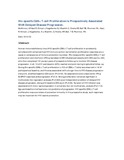| dc.contributor.author | McKinnon, LR Kaul R, Kimani J, Nagelkerke NJ, Wachihi C, Fowke KR, Ball TB, Plummer FA. | |
| dc.contributor.author | Kaul, R | |
| dc.contributor.author | Kimani, J | |
| dc.contributor.author | Nagelkerke, N J | |
| dc.contributor.author | Wachihi, C | |
| dc.contributor.author | Fowke, KR | |
| dc.contributor.author | Ball, T B | |
| dc.contributor.author | Plummer, FA. | |
| dc.date.accessioned | 2013-06-27T10:00:35Z | |
| dc.date.available | 2013-06-27T10:00:35Z | |
| dc.date.issued | 2012-03 | |
| dc.identifier.citation | Immunol Cell Biol. 2012 Mar;90(3):346-51. doi: 10.1038/icb.2011.44. Epub 2011 May 24 | en |
| dc.identifier.uri | http://hinari-gw.who.int/whalecomwww.ncbi.nlm.nih.gov/whalecom0/pubmed/21606945 | |
| dc.identifier.uri | http://erepository.uonbi.ac.ke:8080/xmlui/handle/123456789/41027 | |
| dc.description.abstract | Human immunodeficiency virus (HIV)-specific CD8(+) T-cell proliferation is consistently correlated with enhanced host HIV immune control, but whether proliferative responses are a cause or consequence of immune protection is unclear. We measured Env-specific CD8(+) T-cell proliferation and interferon (IFN)-γ secretion in HIV-infected participants with CD4 counts >200, who then completed 121 person-years of prospective follow-up to monitor HIV disease progression. In all, 13 of 31 participants (42%) reached end point during longitudinal follow-up. Strong Env-specific CD8(+) T-cell proliferation (>10% of CD8(+) T cells) was observed in 14/31 participants at baseline, and this was associated with a longer time to HIV disease progression end point, stratified baseline CD4 count (P=0.016). No associations were observed for IFN-γ ELISPOT responses and progression (P>0.2). Strong proliferation remained significant in multivariate Cox regression analyses (P=0.044) as an independent predictor of delayed HIV disease progression, along with baseline CD4 count (P=0.04). Duration of HIV infection was associated with more rapid progression in univariate, but not multivariate, analysis (P=0.112). Age and baseline viral load were not predictive of progression. HIV-specific CD8(+) T-cell proliferation was a correlate of protective immunity in this prospective study; such responses may be important for HIV vaccine protection. | en |
| dc.language.iso | en | en |
| dc.publisher | University of Nairobi | en |
| dc.title | Hiv-specific Cd8+ T-cell Proliferation Is Prospectively Associated With Delayed Disease Progression. | en |
| dc.type | Article | en |
| local.publisher | Department of Medical Microbiology | en |

